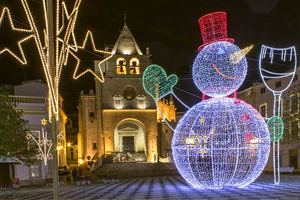Christmas songs from Portugal
An interesting collection of Portuguese Christmas songs from the Smithsonian Institution's Folkways Collection. Any anthology of music for Christmas would be incomplete without the inclusion of the work of Fernando Lopes-Graça, considered by many to be the most outstanding composer of the 20th century. Starting at the age of only fourteen as a pianist at the Cine-Teatro de Tomar, his musical career was marked by his political activities as an opponent of the fascist regime.
This resulted in continued harassment of his studies at conservatories in Portugal and France, including exile and imprisonment. Despite such extreme vicissitudes, Lopes-Graça enriched Portuguese musicology with his assiduous investigation of traditional songs and dances that allowed the writing of two "Christmas Songs". They were first performed on Christmas Eve in 1950 and in 1961 and consisted of a total of thirty-four Christmas carols and ballads from mainly religious sources for the Nativity, New Year and Three Kings. Almost half of them were rooted in the secret region of Trás-os-Montes and reflected some of the oldest Iberian folklore.
Between 1934 and 1958 he wrote another seven concerts for the Christmas season culminating in the "Presente de Natal para as Crianças" (a Christmas present for children) with eight poems of songs dedicated to the humility and holiness of the child.
Strangely for such a national figure, it seems that there are only a few recordings of this vast output and these are mainly digital adaptations of LPs. These are available in CD or MP3 format from companies like Naxos or fromacademic sources such as university libraries.
From the Smithsonian Institution's Folkways Collection I obtained a copy of the recording made on tape in December 1955 in the church of the Basilica de la Estrella. It is only 28 minutes long with ten tracks that include both secular and religious Christmas songs, none of which appear to be attributable to Lopes-Graça but are nonetheless interesting as examples of celebratory Portuguese hymns. The chorus is unnamed, but the sleeve notes state that the ensemble included a piper and an elephant, although their trumpets are not audible!

Comentarios
Publicar un comentario